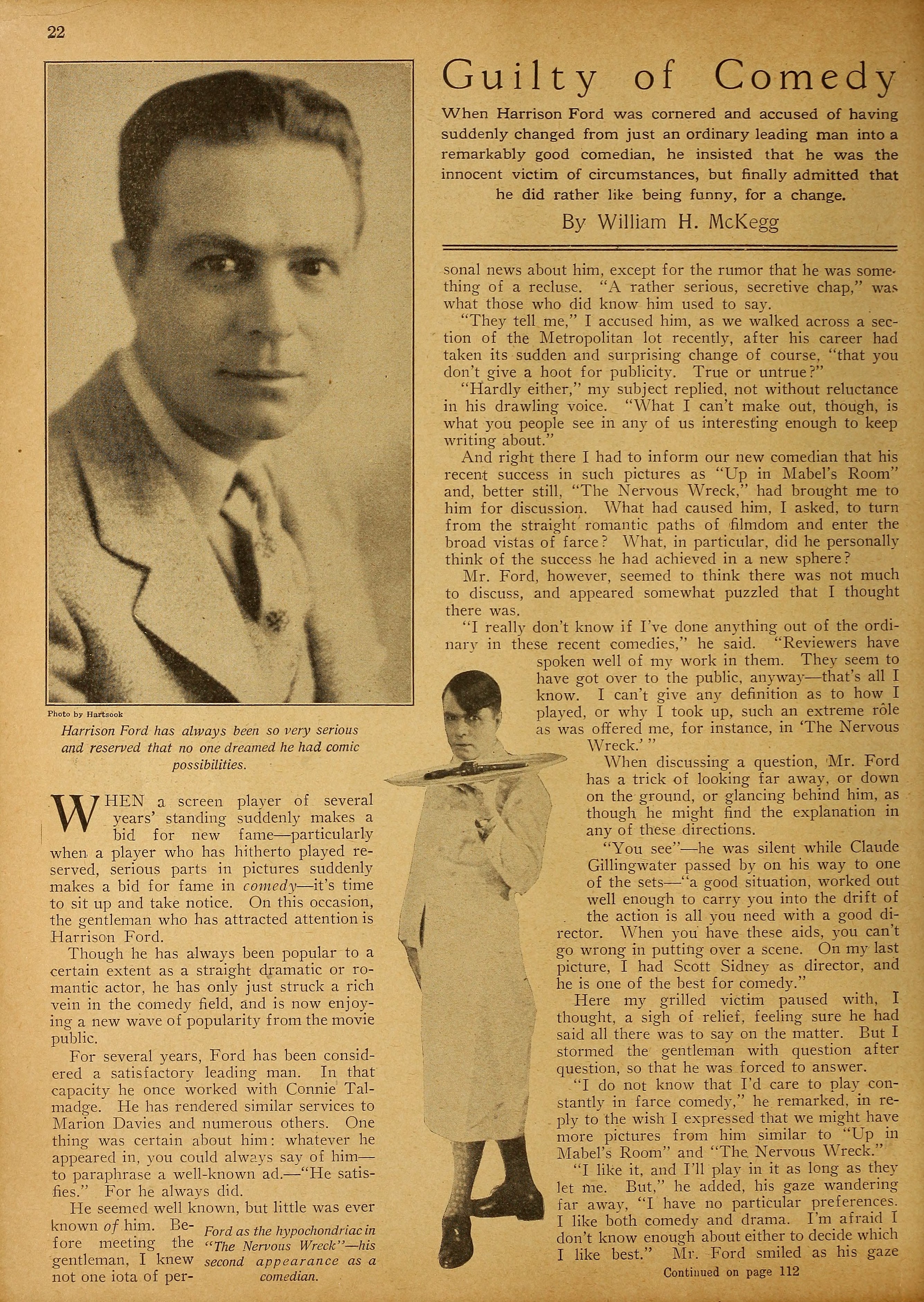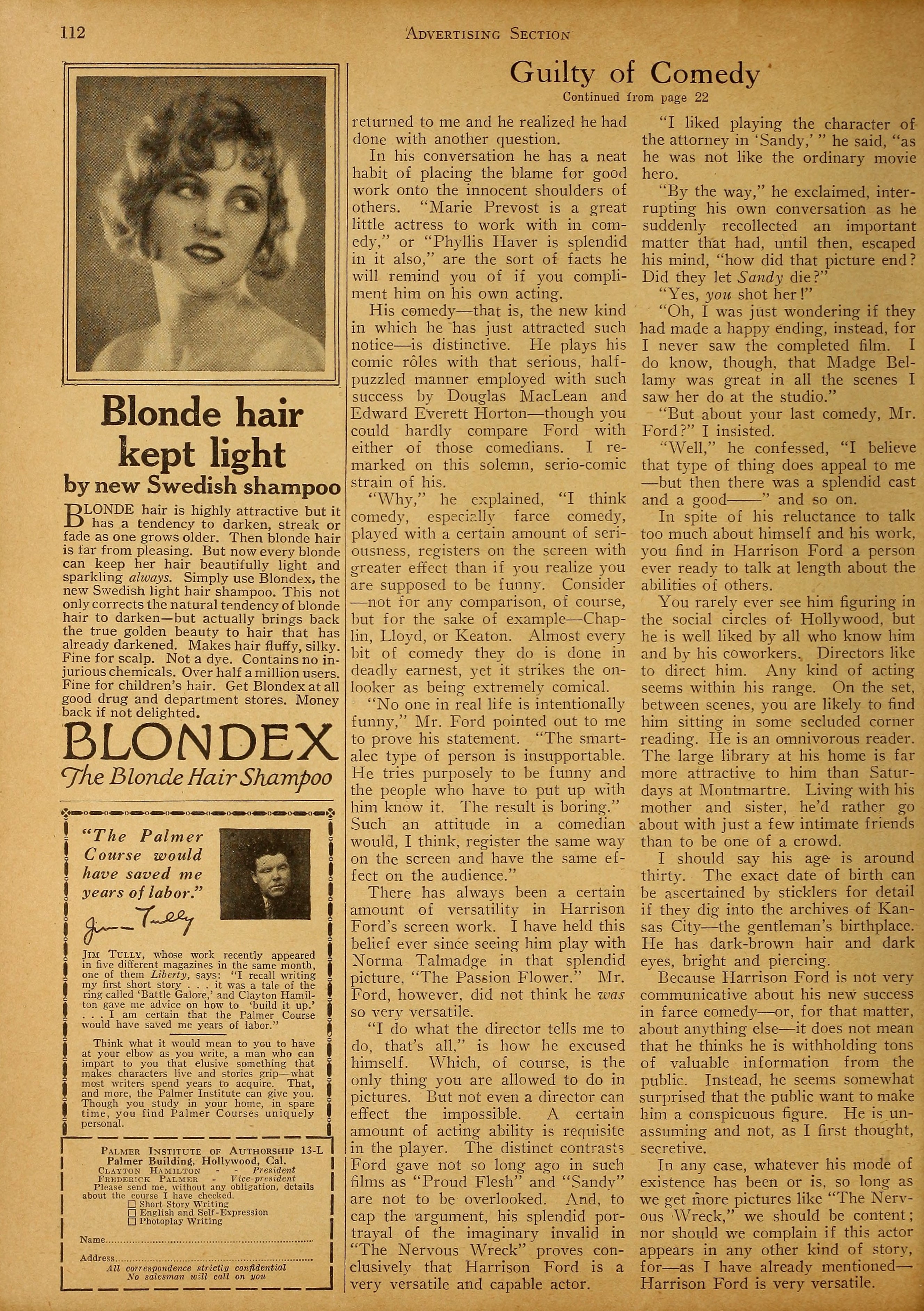Harrison Ford — Guilty of Comedy (1926) 🇺🇸

When a screen player of several years’ standing suddenly makes a bid for new fame — particularly when, a player who has hitherto played reserved, serious parts in pictures suddenly makes a bid for fame in comedy — it’s time to sit up and take notice. On this occasion, the gentleman who has attracted attention is Harrison Ford.
by William H. McKegg
Though he has always been popular to a certain extent as a straight dramatic or romantic actor, he has only just struck a rich vein in the comedy field, and is now enjoying a new wave of popularity from the movie public.
For several years, Ford has been considered a satisfactory leading man. In that capacity he once worked with Connie Talmadge [Constance Talmadge]. He has rendered similar services to Marion Davies and numerous others. One thing was certain about him: whatever he appeared in, you could always say of him — to paraphrase a well-known ad. — “He satisfies.” For he always did.
He seemed well known, but little was ever known of him. Before meeting the gentleman, I knew not one iota of personal news about him, except for the rumor that he was something of a recluse. “A rather serious, secretive chap,” was what those who did know him used to say.
“They tell me,” I accused him, as we walked across a section of the Metropolitan lot recently, after his career had taken its sudden and surprising change of course, “that you don’t give a hoot for publicity. True or untrue?”
“Hardly either,” my subject replied, not without reluctance in his drawling voice. “What I can’t make out, though, is what you people see in any of us interesting enough to keep writing about.”
And right there I had to inform our new comedian that his recent success in such pictures as Up in Mabel’s Room and, better still, The Nervous Wreck, had brought me to him for discussion. What had caused him, I asked, to turn from the straight romantic paths of filmdom and enter the broad vistas of farce? What, in particular, did he personally think of the success he had achieved in a new sphere?
Mr. Ford, however, seemed to think there was not much to discuss, and appeared somewhat puzzled that I thought there was.
“I really don’t know if I’ve done anything out of the ordinary in these recent comedies,” he said. “Reviewers have spoken well of my work in them. They seem to have got over to the public, anyway — that’s all I know. I can’t give any definition as to how I played, or why I took up, such an extreme role as was offered me, for instance, in The Nervous Wreck.”
When discussing a question, Mr. Ford has a trick of looking far away, or down on the ground, or glancing behind him, as though he might find the explanation in any of these directions.
“You see” — he was silent while Claude Gillingwater passed by on his way to one of the sets — “a good situation, worked out well enough to carry you into the drift of the action is all you need with a good director. When you have these aids, you can’t go wrong in putting over a scene. On my last picture, I had Scott Sidney as director, and he is one of the best for comedy.”
Here my grilled victim paused with, I thought, a sigh of relief, feeling sure he had said all there was to say on the matter. But I stormed the gentleman with question after question, so that he was forced to answer.
“I do not know that I’d care to play constantly in farce comedy,” he remarked, in reply to the wish I expressed that we might have more pictures from him similar to Up in Mabel’s Room and The Nervous Wreck.
I like it, and I’ll play in it as long as they let me. But,” he added, his gaze wandering far away, “I have no particular preferences. I like both comedy and drama. I’m afraid I don’t know enough about either to decide which I like best.” Mr. Ford smiled as his gaze returned to me and he realized he had done with another question.
In his conversation he has a neat habit of placing the blame for good work onto the innocent shoulders of others. “Marie Prevost is a great little actress to work with in comedy,” or “Phyllis Haver is splendid in it also,” are the sort of facts he will remind you of if you compliment him on his own acting.
His comedy — that is, the new kind in which he has just attracted such notice — is distinctive. He plays his comic roles with that serious, half-puzzled manner employed with such success by Douglas MacLean and Edward Everett Horton — though you could hardly compare Ford with either of those comedians. I remarked on this solemn, serio-comic strain of his.
“Why,” he explained, “I think comedy, especially farce comedy, played with a certain amount of seriousness, registers on the screen with greater effect than if you realize you are supposed to be funny. Consider — not for any comparison, of course, but for the sake of example — Chaplin, Lloyd, or Keaton [Charles Chaplin, Harold Lloyd, Buster Keaton]. Almost every bit of comedy they do is done in deadly earnest, yet it strikes the onlooker as being extremely comical.
“No one in real life is intentionally funny,” Mr. Ford pointed out to me to prove his statement. “The smart-alec type of person is insupportable. He tries purposely to be funny and the people who have to put up with him know it. The result is boring.” Such an attitude in a comedian would, I think, register the same way on the screen and have the same effect on the audience.”
There has always been a certain amount of versatility in Harrison Ford’s screen work. I have held this belief ever since seeing him play with Norma Talmadge in that splendid picture, The Passion Flower. Mr. Ford, however, did not think he was so very versatile.
“I do what the director tells me to do, that’s all.” is how he excused himself. Which, of course, is the only thing you are allowed to do in pictures. But not even a director can effect the impossible. A certain amount of acting ability is requisite in the player. The distinct contrasts Ford gave not so long ago in such films as Proud Flesh and Sandy are not to be overlooked. And, to cap the argument, his splendid portrayal of the imaginary invalid in The Nervous Wreck proves conclusively that Harrison Ford is a very versatile and capable actor.
“I liked playing the character of the attorney in Sandy, “he said, “as he was not like the ordinary movie hero.”
“By the way,” he exclaimed, interrupting his own conversation as he suddenly recollected an important matter that had, until then, escaped his mind, “how did that picture end? Did they let Sandy die?”
“Yes, you shot her!”
“Oh, I was just wondering if they had made a happy ending, instead, for I never saw the completed film. I do know, though, that Madge Bellamy was great in all the scenes I saw her do at the studio.”
“But about your last comedy, Mr. Ford?” I insisted.
“Well,” he confessed, “I believe that type of thing does appeal to me — but then there was a splendid cast and a good —” and so on.
In spite of his reluctance to talk too much about himself and his work, you find in Harrison Ford a person ever ready to talk at length about the abilities of others.
You rarely ever see him figuring in the social circles of- Hollywood, but he is well liked by all who know him and by his co-workers. Directors like to direct him. Any kind of acting seems within his range. On the set, between scenes, you are likely to find him sitting in some secluded corner reading. He is an omnivorous reader. The large library at his home is far more attractive to him than Saturdays at Montmartre. Living with his mother and sister, he’d rather go about with just a few intimate friends than to be one of a crowd.
I should say his age is around thirty. The exact date of birth can be ascertained by sticklers for detail if they dig into the archives of Kansas City — the gentleman’s birthplace. He has dark-brown hair and dark eyes, bright and piercing.
Because Harrison Ford is not very communicative about his new success in farce comedy — or, for that matter, about anything else — it does not mean that he thinks he is withholding tons of valuable information from the public. Instead, he seems somewhat surprised that the public want to make him a conspicuous figure. He is unassuming and not, as I first thought, secretive.
In any case, whatever his mode of existence has been or is, so long as we get more pictures like The Nervous Wreck, we should be content; nor should we complain if this actor appears in any other kind of story, for — as I have already mentioned — Harrison Ford is very versatile.
Collection: Picture Play Magazine, November 1926

Harrison Ford has always been so very serious and reserved that no one dreamed he had comic possibilities.
Photo by: Fred Hartsook (1876–1930)
Ford as the hypochondriac in The Nervous Wreck — his second appearance as a comedian.

Collection: Picture Play Magazine, November 1926
